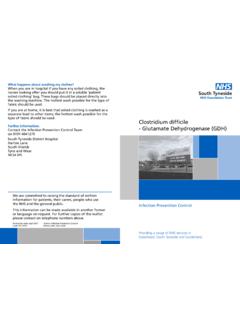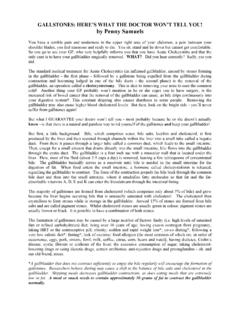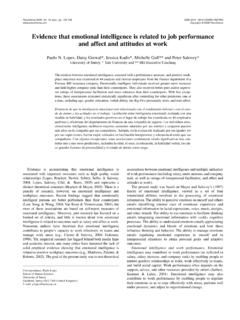Transcription of InformationforadultshavinganMRIscan ...
1 South Tyneside NHS Foundation Trust Information for adults having an MRI scan of the gallbladder and biliary tree (an MRCP scan). Department: Radiology Providing a range of NHS services in Gateshead, South Tyneside and Sunderland. 2. Introduction This leaflet tells you about having an MRCP scan. It explains how the scan is done, the risks involved and what to expect. What is an MRI scan? Magnetic Resonance Cholangiopancreatography (MRCP) is a special type of Magnetic Resonance Imaging (MRI) scan that produces pictures of the gall bladder, bile ducts and pancreatic duct. MRI is the name given to a technique which takes very detailed pictures through the body. It uses a powerful magnetic field and radio waves, together with an advanced computer system to build up a series of images, each one showing a thin slice of the area being examined. These images can show both bone and soft tissues such as muscle, nerves and blood vessels and organs such as your brain and heart. Because the MRI scanner takes very detailed pictures of the body it can often show things that aren't seen on x-ray or other tests such as ultrasound.
2 The scanner looks like a tunnel about one and a half meters long and is open at both ends. The area of the body that is under investigation will be positioned so that it is in the centre of the tunnel. 3. What is MRCP used for? The uses of MRCP include: Checking the liver, bile ducts, gallbladder and pancreas for gallstones, tumours, infection or inflammation Investigating the cause of pancreatitis (inflammation of the pancreas). Investigating unexplained abdominal pain Used as a less invasive alternative to endoscopic retrograde cholagiopantcreatography (ERCP). Are there any risks with MRI? MRI is an extremely safe procedure and does not hurt. It does not involve the use of x-rays. However not everyone can have an MRI scan. The magnetic field affects some metals and can cause any metal inside the body to move. This could potentially cause an injury. It is very important to contact us before coming for your appointment if you have, or have had, any of the following: Pacemaker Neuro-stimulator Artificial heart valve Aneurysm clips (metal clips that are inserted during some operations, especially in the blood vessels in the brain).
3 Any surgery which involved placing implants in your head or body Any surgery in the six weeks before your appointment Metal fragments in the eye (even if you think the metal has been removed). You may need to have an x-ray first to prove there are no metal bits left 4. Metal pins and plates that have been in for a long period of time should not create a problem but if you have any of these you should mention it to the radiographers when you arrive. Other important information Please also contact us if the following applies to you: You are pregnant (MRI scanning is not advisable in early pregnancy unless there are special circumstances). You weigh over 22 stone (137 kilograms). This is the weight limit of the scanner. Patients who weigh more than this may need to have an alternative examination or be sent to a different type of MRI scanner You are claustrophobic. A small proportion of people find having a MRI scan difficult due to the confined space in the scanner. If you are worried about this aspect please contact the MRI department for advice.
4 If you want to have a mild sedative to help you relax during the scan you should speak to your GP in advance of the appointment to arrange this You have problems weight-bearing and need a hoist to transfer You are unable to keep still or lie flat You need an interpreter. Please tell us this when you receive your appointment so that we can arrange an official interpreter for you You require ambulance transport to bring you to the hospital. We may need to change the time of your appointment. You will need to contact your GP to book the ambulance transport If you don't tell us about any of any of the above we may be unable to scan you on the day of your appointment. 5. What are the alternatives to an MRCP? Endoscopic retrograde cholangiopancreatography (ERCP) is an alternative way of looking at the gall bladder, bile ducts and pancreatic duct. ERCP is a more invasive procedure than MRCP. and may require intravenous sedation. ERCP involves passing an endoscope (a long flexible tube that contains a light source and a video camera) through the oesophagus and stomach into the duodenum in order to pass a fine tube (cannula) into the bile duct or pancreatic duct.
5 Contrast (dye) is injected through the cannula into the ducts in order to visualise them on x-rays. The risks of ERCP include inflammation of the pancreas (pancreatitis), perforation of the pancreatic or bile ducts and the risks associated with intravenous sedation and ionising radiation (x-rays). Is there any preparation for the scan? Your appointment letter will ask you to confirm that you can attend the appointment time that has been offered to you. When you telephone you will be asked some safety questions to check the scan is suitable for you. You will also be able to ask any questions that you may have about the scan. It is very important that you do not eat or drink anything for the four hours before the scan. Food and liquid in your stomach can make it difficult to obtain images of your bile or pancreatic ducts. You may continue to take any medicine you have been prescribed. Please remove any makeup, nail polish or other cosmetics that contain metal as they may affect the pictures.
6 It would be helpful if you could leave any valuables at home and remove any jewellery before arriving for your appointment. If you are diabetic and are concerned about fasting for four hours prior to the scan, please inform us when you telephone to confirm your attendance. 6. What happens when I arrive at the department? When you arrive at the MRI department you should go to the reception desk where you will be booked in and given a seat in the waiting area. You will be asked to complete and sign a safety questionnaire. A radiographer will then go through the questionnaire with you, explain the procedure and answer any questions that you may have. You will be asked to change into a hospital gown. You will be also be asked to remove anything that may contain metal such as zips, jewellery, hair grip, wigs, body piercing and money before entering the scan room because of the powerful magnet. Credit cards are also affected by the magnet. You will be provided with a locker to put your clothing and belongings into whilst you have your scan.
7 You will be given a carton of pineapple juice and asked to drink this 15 minutes prior to your scan. The pineapple juice contains manganese which helps to give better pictures during the scan. What will happen during my MRCP scan? The MRI staff will position you on a couch which slides into the scanner. A sophisticated antenna known as a coil will be placed around your abdomen much like a belt. The purpose of the coil is to improve the quality of the MRCP images. Once you are comfortable and in the correct position, it is important that you remain very still during the scan, as any movement will affect the quality of the pictures. You will be given a buzzer to press in case you need to contact the radiographer during the scan. The radiographer will be able to see you through a window during the scan and will talk to you via an intercom in between the pictures. 7. The picture below shows the position for a MRCP scan. Throughout the scan you will hear repeated loud banging, buzzing and tapping noises which stop and start.
8 These noises are normal during a scan and we will provide you with headphones to protect your ears from some of the noise. You will be asked to hold your breath for a short period of time for some of the pictures. How long will the scan take? The MRCP scan will take approximately fifteen minutes. Please expect to be in the department for at least one hour as your appointment time also includes the time for us to check your safety questionnaire and prepare you for your scan. The appointment time will be longer if any other parts of the body are also to be scanned. On rare occasions emergency patients must be scanned and this may lead to a delay. However, we will keep you informed of any delays. What happens after the scan? You may leave the department as soon as your scan is finished. You can also eat and drink as usual. There are no side effects from the scan itself. 8. Are there any precautions to take if I have taken a sedative for the scan? If you have taken a sedative for the scan it can temporarily affect your co-ordination and reasoning skills so you must not drive, drink alcohol, operate machinery, sign a legal document or take any medication that has not been prescribed for 24 hours afterwards.
9 If you have had a sedative, you will need to arrange for someone to drive you home. Try to have a friend or relative stay with you at home for the first 24 hours after the scan as you may feel drowsy. When will I get the scan results? The radiographer will not be able to give you your results on the day of your scan as the MRI images will need to be interpreted carefully by a radiologist. The results of the scan will be sent back to the person who sent you for the scan within five working days. If you have not received an appointment to see your referrer within three weeks of having the scan, you will need to contact them to check when you will receive the results. What if I can't keep my MRI appointment? If you can't keep your appointment please contact the MRI. department straight away. If you are admitted to hospital before your appointment, please tell the ward staff that you have an MRI appointment booked. 9. If you have a query about the MRI scan If you have any other questions, worries or doubts, do not hesitate to contact us prior to your appointment on: MRI Department: 0191 404 1081.
10 Opening hours: Monday-Thursday , Friday , Saturday - 12noon. Other Sources of information For general information about Radiology Departments visit the Royal College of Radiologists' website: For other MRI information leaflets visit South Tyneside Foundation Trust website: patients/patient-information 10. How to find us For directions and map of the hospital visit South Tyneside Foundation Trust website: to-find-us The MRI Department is located off the Hospital Main Corridor;. there are numerous signs to guide you. From the Ingham Wing Main Entrance - go straight on, past reception, the hospital shop and the lift lobby. Turn left onto the main corridor, turn right before you reach X-Ray the MRI. Department is on your right hand side. From the Outpatients Entrance - go straight on past the Help Desk and Coffee Shop, until you come to the end of the carpeted area. Turn right onto the Main Corridor; continue on past X-Ray, the next left will bring you to the MRI Department From the Maternity Entrance - go straight on past the Delivery Suite, lift area, Chapel and Restaurant onto the main corridor, continue along this for some distance, and take the first right hand turn you come to.








